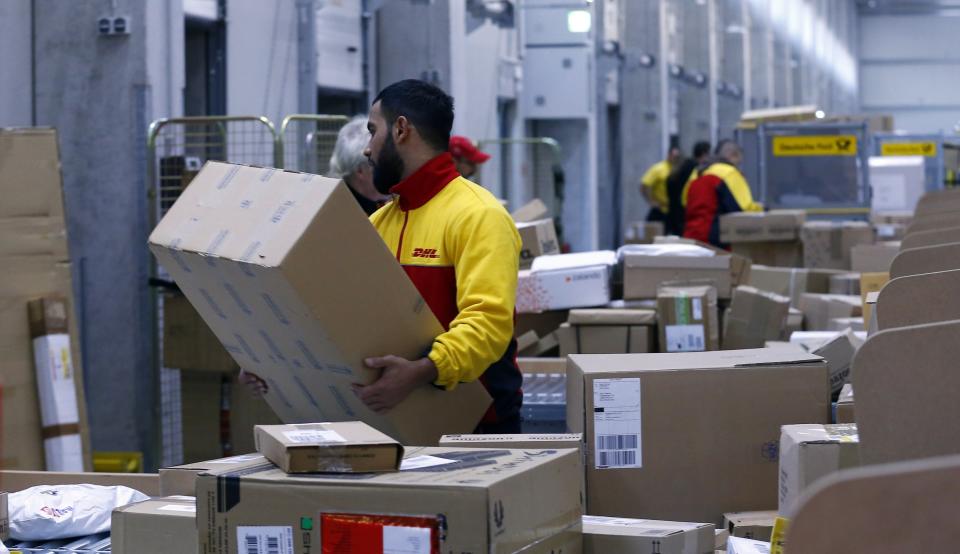German business morale surges but third-quarter growth moderate
By Michelle Martin
BERLIN (Reuters) - German business morale surged to its strongest in a year and a half in November, suggesting Europe's largest economy is gaining steam into the end of the year after growing by a modest 0.3 percent in the third quarter.
The Munich-based Ifo think tank said on Friday its business climate index, based on a monthly survey of 7,000 firms, rose to 109.3, beating the consensus forecast in a Reuters poll for a rise to 107.7 and surpassing the highest estimate for 108.5.
The increase in the index, which had fallen in October, sent the euro higher and pushed German Bund futures lower.
"Companies have got over the slight setbacks of last month in an impressive way and are counting on recovery," said Joerg Zeuner, an economist with government-owned banking group KfW.
The ZEW survey this week showed investor sentiment at its highest in four years and a regular report from business purchasing managers (PMI) showed that the private sector's expansion was gaining traction.
That suggested the economy could expand by 0.5 percent in the fourth quarter - but economists caution that the forward-looking indicators have not been borne out recently by harder measures like output and GDP.
"November's German Ifo index echoes the message of the ZEW survey and PMI that the economy might have regained a bit of momentum in the fourth quarter after Q3's slowdown," said Jonathan Loynes, chief European economist at Capital Economics.
"Note, though, that the survey evidence has tended to over-state the strength of the German economy over recent quarters."
A breakdown of GDP data on Friday showed a robust rise in domestic demand overshadowed weak exports to drive the third quarter's 0.3 percent growth - down from 0.7 percent in the second quarter. Monthly numbers have shown industrial orders and exports rising, though imports have fallen and unemployment has climbed.
The Ifo report showed firms had the highest expectations since spring 2011 and were the most upbeat about their current situation since June 2012. More than half of German blue-chip companies reported better-than-expected results in recent weeks.
ROBUST DEMAND
Friday's data showed domestic demand was the main growth driver between July and September, rising 0.7 percent. That gives the government ammunition in its showdown with Brussels over euro zone trade imbalances.
The European Commission is investigating Germany's high current account surplus amid criticism that it relies too heavily on exports, yet the breakdown showed that net trade deducted 0.4 percentage points from third-quarter growth.
"With today's data the latest criticism on the German growth model looks a bit like crying over spilled milk," said Carsten Brzeski, senior economist at ING. "The often called-for rebalancing of the economy is already taking place."
Business is worried that coalition talks between Chancellor Angela Merkel and the Social Democrats could hurt them with measures like a minimum wage and higher welfare spending.
"We will also participate in convergence by slowing down our growth and making our country a little bit less competitive," warned Martin Blessing, CEO of Commerzbank.
GDP data showed investment, which began the year sluggishly, rising by a robust 3.0 percent, propelled by a strong increase in construction. Private consumption added 0.1 percentage points to GDP, helped by a robust job market and moderate inflation.
Berlin is relying on domestic demand to prop up growth as the traditionally export-driven economy suffers from weakening demand from the euro zone and a slowdown in emerging markets.
Growth in Germany helped the euro zone stave off stagnation in the third quarter as France and strugglers like Greece and Italy contracted, but it was only marginally stronger than bailout recipient Portugal's 0.2 percent.
(Additional reporting by Joern Poltz in Munich, Noah Barkin in Berlin, Maria Sheahan and Arno Schuetze in Frankfurt; Editing by Stephen Brown and Patrick Graham)

 Yahoo Finance
Yahoo Finance 

